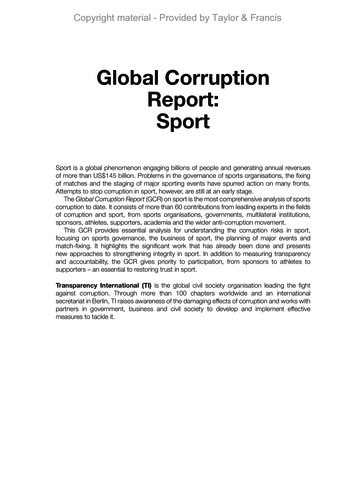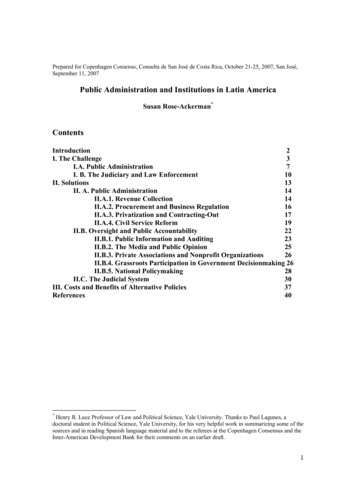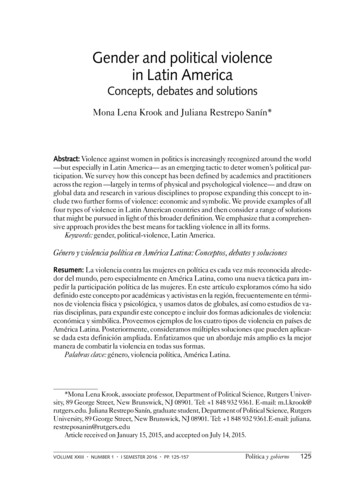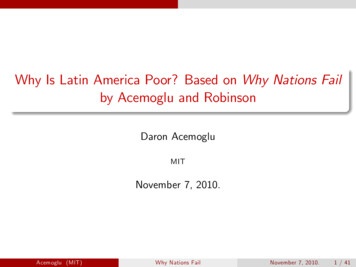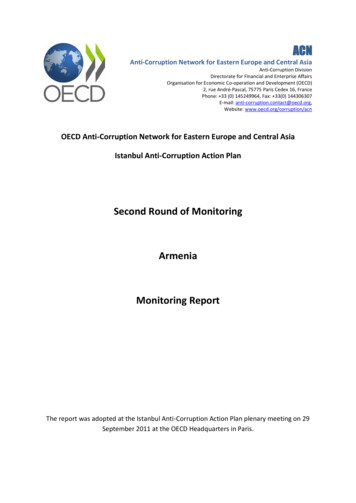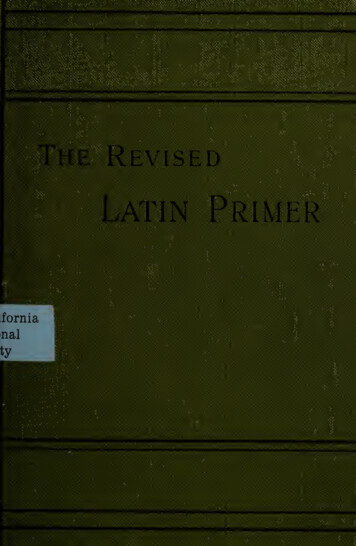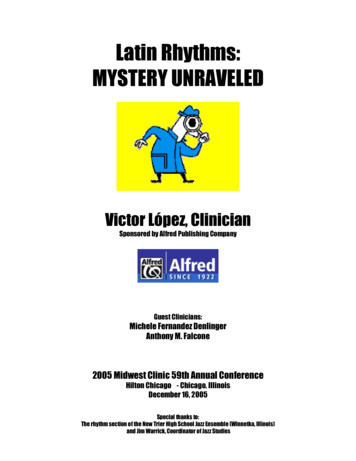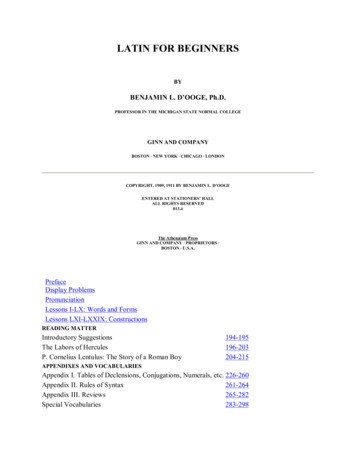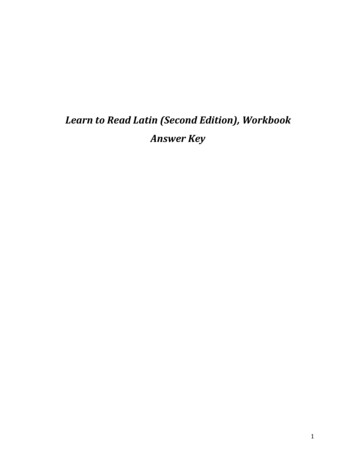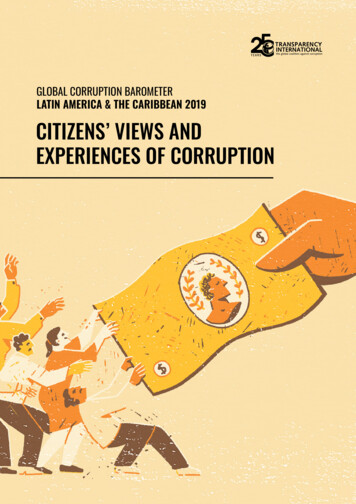
Transcription
GLOBAL CORRUPTION BAROMETERLATIN AMERICA & THE CARIBBEAN 2019CITIZENS’ VIEWS ANDEXPERIENCES OF CORRUPTION
Transparency International is a global movement withone vision: a world in which government, business,civil society and the daily lives of people are free ofcorruption. With more than 100 chapters worldwide andan international secretariat in Berlin, we are leading thefight against corruption to turn this vision into reality.www.transparency.orgAuthors: Coralie Pring, Jon VrushiContributors: Dr. Caryn PeifferDesigner: Sophie Everett sophieeverett.com.auCover image: Augusto Zambonato augustozambonato.comEvery effort has been made to verify the accuracy of the informationcontained in this report. All information was believed to be correctas of September 2019. Nevertheless, Transparency Internationalcannot accept responsibility for the consequences of its use for otherpurposes or in other contexts.ISBN: 978-3-96076-126-62019 Transparency International. Except where otherwise noted, thiswork is licensed under CC BY-ND 4.0 DE. Quotation permitted. Pleasecontact Transparency International – copyright@transparency.org –regarding derivatives requests.
GLOBAL CORRUPTION BAROMETER – LATIN AMERICA & THE CARIBBEAN 2019TABLE OF CONTENTSGLOBALCORRUPTIONBAROMETERLATIN AMERICA &THE CARIBBEAN 20192-7Executive summaryThe surveyKey findingsRecommendations8-15What do citizens thinkabout corruption?Corruption on the riseGovernment corruptionis a problem16-19How are citizensaffected by corruption?One in five citizens paysbribesPolice have highestbribery rateWhy people pay bribesAge matters20-23Women and corruptionLow trust ingovernment,courts and policeSextortionGovernments notdoing enoughPolitical integrityPresidents, primeministers andparliamentarians seenas most corrupt24-2728-31Taking actionCitizens can helpstop corruptionRetaliation and lackof action are the biggesthurdlesDo citizens knowtheir ountry cards54-56Endnotes
TRANSPARENCY INTERNATIONALEXECUTIVESUMMARYIn the last five years, momentum has been building againstcorruption in Latin America and the Caribbean. High-levelpoliticians were found guilty of corruption in Guatemala andBrazil, and a wave of legal action against the perpetrators of grandcorruption swept across the continent, including the Lava Jatoinvestigation, or “Operation Car Wash”, in Brazil. This presents areal opportunity for anti-corruption in the region.photo: iStock.com / FernandoPodolski2
GLOBAL CORRUPTION BAROMETER – LATIN AMERICA & THE CARIBBEAN 2019However, this 10th edition ofthe Global Corruption Barometer– Latin America and the Caribbeanshows that most citizens thinktheir governments are not doingenough to tackle corruptionand that corruption levels haveincreased in the past 12 monthsacross the region.Corruption hinders economicgrowth and the delivery ofpublic services. In some cases,corruption even deprivespeople of their human rightsand dignity, like when citizensare coerced to provide sexualfavours in exchange for publicservices, such as health andeducation – a practice known assexual extortion or “sextortion”.A lack of political integrityrisks undermining democraticfoundations in many LatinAmerican and Caribbeancountries. This can be seenin the abuse of electoralprocesses, such as vote-buyingand the spread of fake news,and in the weakening ofpolitical institutions. A growingdistrust and disappointment ingovernment has contributedto increasing anti-corruptionsentiment across the region,but this is empowering populistleaders who frequently makematters worse.Despite these challenges,people are overwhelminglypositive in their desire tomake a difference in the fightagainst corruption. Ultimately,people have the right to reportcorruption, demand thatpoliticians act with integrity,and seize opportunities toactively shape the decisions andprocesses which affect theirlives, families and communities.3
TRANSPARENCY INTERNATIONALThe surveyThe Global CorruptionBarometer – Latin America andthe Caribbean, published byTransparency International,presents the largest, mostdetailed set of public opiniondata on citizens’ views oncorruption and their directexperiences of bribery in LatinAmerica and the Caribbean.Between January and March2019, the Global CorruptionBarometer (GCB) surveyedmore than 17,000 citizens in 18countries across the region.The results show that morethan half of all citizens thinkcorruption is getting worse intheir country and that theirgovernment is doing a bad jobat tackling it.extortion, or sextortion, one ofthe most significant forms ofgendered corruption.The GCB found more thanone in five people who accessedpublic services, such as waterand electricity, paid a bribe inthe preceding year. This equatesto approximately 56 millioncitizens in the 18 countriessurveyed.The data also highlights votebuying, threats of retaliation ifcitizens don’t vote a certain way,and the spread of fake news.The GCB also reveals thatcorruption is hitting some ofthe most vulnerable people thehardest; women are more likelyto pay bribes for health servicesand public school education.Furthermore, for the first time,the GCB sheds light on sexualDespite this, the GCB raiseshope for positive change.Seventy-seven per cent of peoplethink that citizens can help stopcorruption.ABOUT THE SURVEYCONDUCTEDFROMJANUARY - MARCH201917,000 PEOPLE AGED18 TOOK PARTNATIONALLYREPRESENTATIVEFACE-TO-FACE IN 17 COUNTRIES,BY TELEPHONE IN ONE COUNTRY1418COUNTRIESSURVEYEDIPSOS PERU, MARKETRESEARCH SERVICES ANDPUBLIC DOMAINFIELDED THESURVEY
GLOBAL CORRUPTION BAROMETER – LATIN AMERICA & THE CARIBBEAN 2019KEY FINDINGS010203Corruption is on the riseGovernments arenot doing enoughPresidents, prime ministersand parliamentarians areseen as most corruptMore than half of people thinkmost or all elected politiciansand their officials are corruptand favour private overpublic interests.More than half (53 per cent) ofall citizens think that corruptionincreased in the previous 12months. Only 16 per cent thinkit declined.Only 39 per cent of citizens thinktheir government is doing agood job at fighting corruption,while over half (57 per cent)think their government isperforming badly.040506Bribery is a regularoccurrence for manySexual extortionis a major issuePolitical integrity is lacking,especially around electionsMore than one in five citizenswho accessed public services,such as health care andeducation, paid a bribe in theprevious year.One in five citizens experiencessexual extortion – or sextortion– when accessing a governmentservice, or knows someonewho has.One in four citizens was offeredbribes in exchange for votes inthe past five years.07Despite fears of retaliation,citizens can make a differenceSeventy-seven per cent ofcitizens believe that ordinarypeople can make a differencein the fight against corruption.5
TRANSPARENCY INTERNATIONALRecommendationsThe ever-changing politicalenvironment in Latin Americaand the Caribbean, togetherwith the high-profile corruptionscandals that shook the regionin recent years, remind us thatnow, more than ever, leadersneed to fight corruption andstrengthen democracy. Keymeasures include:1. ADVOCATE FORSTRONGER POLITICALINTEGRITY, ESPECIALLYAROUND ELECTIONS2. IMPROVETRANSPARENCY OFPOLITICAL FINANCE3. REDUCE ENABLERSOF BRIBERY, ESPECIALLYIN PUBLIC SERVICESGovernments should ensure atransparent environment forelections, enforce sanctionsagainst vote-buying anduphold and reform campaignfinance regulations. In addition,governments and businessesshould tackle fake newsby reducing the economicincentives for producing itand by supporting fact-basedjournalism.Governments should establishregulations; ensure disclosureof incomes, spending, assetsand loans of political parties orcandidates on an ongoing basis;and ensure all information ispublished in a single onlineportal, in open data format.Governments shouldmake public services moreefficient, invest in user-friendlyonline platforms to accessservices and streamlinebureaucratic processes.4. STRENGTHENJUDICIAL INSTITUTIONS5. EMPOWERINDIVIDUALS, CIVILSOCIETY AND MEDIA TOREPORT CORRUPTION6. RECOGNISE ANDADDRESS SPECIFICGENDERED FORMSOF CORRUPTIONGovernments must promotenon-political and independentjudicial appointments; improvethe well-being of judicial staff,judges and law-enforcementofficials; and create transparentcriteria for case assignments.Governments should engagecivil society and create a safeand enabling environment forNGOs and media to monitorand report corruption. Countriesmust adopt and enforcecomprehensive legislationto protect whistleblowers,based on prevailinginternational standards.Governments shouldrecognise sexual extortionas a form of corruption andtake measures to reduce theculture of shaming and victimblaming that discourageswomen from reporting abuses.Justice systems should havethe right tools to addresssextortion cases and createsafe, accountable, accessibleand, most importantly, gendersensitive reporting mechanisms.6
GLOBAL CORRUPTION BAROMETER – LATIN AMERICA & THE CARIBBEAN 20197. IMPLEMENT THELIMA COMMITMENTGovernments must implementand publicly report on progresstowards the Lima Commitmentadopted at the VIII Summit ofthe Americas, which outlines57 actions to strengthendemocratic governanceagainst corruption.photo: iStock.com / rchphoto7
TRANSPARENCY INTERNATIONALWHAT DO CITIZENS THINKABOUT CORRUPTION?We asked people what they thought about the state of corruption in theircountry – how prevalent it is, whether it is rising or declining and whethertheir government is doing enough to control it. Here’s what we found.CORRUPTION ON THE RISE,BY 2%65%66%87%Percentage of people who think corruptionincreased in the previous 12 ZUELAEPUBLIC0
GLOBAL CORRUPTION BAROMETER – LATIN AMERICA & THE CARIBBEAN 2019Corruption on the riseA majority of Latin Americanand Caribbean citizens (53 percent) think corruption increasedin their country in the previous12 months, while far fewer thinkit declined (16 per cent).In Venezuela, anoverwhelming number ofcitizens (87 per cent) thinkcorruption increased – thehighest percentage in theregion. Most citizens in theDominican Republic and Perualso think that corruptionincreased (66 per cent and 65per cent respectively).Unfortunately, in no countrydoes a majority of citizens thinkthat corruption is decreasing.Only in Guyana do we see asizeable proportion of citizens(40 per cent) reportingdecreasing corruption, although40 per cent of Guyanese alsothink it is increasing.53%16%29%OF PEOPLE THINKCORRUPTION INCREASEDIN THE PREVIOUS 12 MONTHSTHINK CORRUPTIONDECREASEDTHINK CORRUPTIONSTAYED THE SAMECountry in focus: Dominican RepublicMany citizens think corruption is on the rise in the Dominican Republic, with recent research confirming theirperception. Participación Ciudadana, Transparency International’s chapter in the Dominican Republic, publishedseveral reports, including Twenty Years of Impunity3 and Corruption without Punishment,4 which highlight thatmore than 300 cases of corruption between 1983 and 2013, were followed by only one conviction.The Lava Jato scandal is a powerful example of such impunity. The Brazilian company, Odebrecht,confessed to paying approximately US 92 million in bribes in the Dominican Republic alone,5 and dedicatedan entire department to managing bribes there and in 11 other countries.6 The company also admitted toinflating the value of several construction contracts, many of which were two to three times higher than theoriginal quotes.7Despite these admissions, the government reached an agreement with Odebrecht that allowed the companyto continue operating in the Dominican Republic in exchange for a fine.8 The prosecution argued a case thatimplicated only six people9 and excluded some of the largest construction contracts.10To date, no one has been held accountable for Lava Jato in the Dominican Republic. The government has yetto question those convicted of the scandal in Brazil or investigate campaign financing from Odebrecht.9
TRANSPARENCY INTERNATIONAL85Governmentcorruption is a problemWhen asked whethercorruption in governmentis a problem in their country,an overwhelming majority ofpeople in the region (85 percent) said corruption is a bigproblem. Only 13 per centsaid corruption is no problemor a small problem.THINK GOVERNMENTCORRUPTION IS ABIG PROBLEM%THINK GOVERNMENTCORRUPTION ISNO PROBLEM ORA SMALL PROBLEM13Peru and Colombia have thehighest percentage of citizenswho consider governmentcorruption to be a big problemin their country (96 and 94 percent respectively).%GOVERNMENT CORRUPTION,BY 3%93%94%96%Percentage of people who think corruptionin government is a big BIAARGCOLOMPERU0
GLOBAL CORRUPTION BAROMETER – LATIN AMERICA & THE CARIBBEAN 2019Low trust ingovernment,courts and policeCorruption contributes tothe erosion of citizens’ trustin government. The resultsshow that trust in government,courts and police is very lowacross Latin America and theCaribbean.Barbados and Guyana arethe only two countries where amajority of citizens have trust ingovernment, courts and police.In Venezuela, El Salvador,Colombia, Guatemala, Panamaand Peru, 90 per cent or moreof citizens report having little orno trust in these institutions.ONLY21%27%33%HAVE TRUST ANDCONFIDENCE INTHEIR GOVERNMENTHAVE TRUST ANDCONFIDENCE INTHE COURTSHAVE TRUST ANDCONFIDENCE INTHE POLICE12Country in focus: BrazilIn Brazil, the survey was conducted during the first few months of President Bolsonaro’s administration, tooearly to evaluate any new actions taken by the
foundations in many Latin American and Caribbean countries. This can be seen in the abuse of electoral processes, such as vote-buying and the spread of fake news, and in the weakening of political institutions. A growing distrust and disappointment in government has contributed to increasing anti-corruption sentiment across the region,
